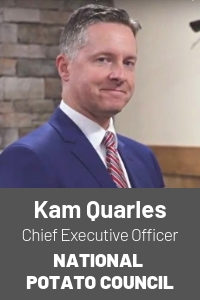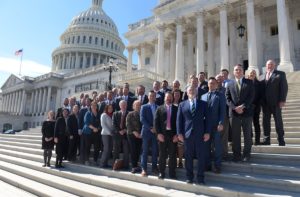NPC: Setting policy agenda for potato growers for 2022
During this year’s Washington Summit (Feb. 18-March 2), potato growers from across the country joined the National Potato Council (NPC) in D.C. during a tumultuous time for our industry and our country.
The impact of inflation on consumer goods and ag inputs, trade disputes with important industry partners, and the war in Ukraine were all on our minds as we sat down to set our policy agenda for 2022.
Even with this challenging backdrop, the group focused on a number of proactive policy goals that deliver long-term benefits for our potato farms and the families and communities they support.
Easing supply chain challenges
 The U.S. potato industry is dependent upon an efficient transportation system in moving product from the farm through the supply chain to the end consumer. Unfortunately, current supply chain disruptions are creating severe shortages of vital inputs for potato production and inflating prices for those fortunate producers who can secure supply. During the Summit, NPC identified several specific regulatory and legislative actions that could assist in relieving some of the current bottlenecks that are severely impacting producers, including removing burdens on truck drivers and easing the regulatory load of shippers.
The U.S. potato industry is dependent upon an efficient transportation system in moving product from the farm through the supply chain to the end consumer. Unfortunately, current supply chain disruptions are creating severe shortages of vital inputs for potato production and inflating prices for those fortunate producers who can secure supply. During the Summit, NPC identified several specific regulatory and legislative actions that could assist in relieving some of the current bottlenecks that are severely impacting producers, including removing burdens on truck drivers and easing the regulatory load of shippers.
The U.S. is suffering from a severe lack of qualified commercial truck drivers, which has a disproportionate impact on U.S. agriculture. Exacerbating this problem are new Biden Administration mandates that greatly increase the hourly burden on new drivers to obtain commercial driver’s licenses (CDL). In 2022, NPC will continue to urge the administration to reconsider the unintended consequences of these new regulatory mandates and seek to address safety through less obstructive means.

A related effort involves easing restrictions of truck drivers’ Hours-of-Service (HOS) regulations, particularly during planting and harvest seasons. NPC is advocating for enhancing HOS rules to acknowledge the unique challenges for transporting perishable commodities and expanding the current 150-mile loading exemption to cover both loading and unloading activities. Truck drivers should not be penalized for encountering delays at loading points or congestion at distribution warehouses or port facilities. NPC believes that time spent idling in a marshaling yard should not count against HOS mandates.
U.S. potato growers are also pushing for Congress to pass the Ocean Shipping Reform Act (OSRA), which is intended to ease the supply chain bottleneck at the ports. The legislation is designed to reduce the burden upon shippers who are suffering from supply chain disruptions impacting intermodal freight transiting through commercial seaports. Currently, shippers are having to pay daily demurrage charges (or monetary penalties) for containers that are stuck in seaports through no fault of the shipper. This is costing thousands of unnecessary dollars and keeping valuable equipment idle, thereby driving up freight rates due to lowered supply. The NPC-backed OSRA would prohibit these types of burdens and utilize data to avoid future bottlenecks.
Addressing workforce challenges
Your readers are acutely aware of the challenges faced by agriculture to find labor to plant and harvest crops. To address the crisis, last year the House of Representatives passed the NPC-supported bipartisan Farm Workforce Modernization Act — the second time it has passed the bill in consecutive sessions of Congress. NPC and our partners in the Agriculture Workforce Coalition are now encouraging the Senate to improve upon that bill and create the opportunity to secure a long-term fix to this crisis.
We believe these improvements should focus on providing U.S. agriculture access to a guestworker program with the flexibility to meet the current and future demands of American agriculture that includes: (1) a predictable market-based wage rate; (2) responsive visa terms and no “hard caps” on participation; (3) and reducing the costs of program participation, among other priorities.
Additionally, the Senate should act to stabilize the current improperly documented workforce through a program that incentivizes foreign-born workers to remain in American agriculture. We believe these pieces must be in place before any additional enforcement measures can be implemented. Mandatory E-Verify (alone or with an “agriculture exemption”) would be extremely destructive to our industry and cannot move forward without an ag labor solution.
These are just a few of the policy priorities being supported by U.S. potato growers this year. To find out more about how the grower-led National Potato Council is fighting for policies that protect the long-term health of our industry, visit nationalpotatocouncil.org/advocacy.














